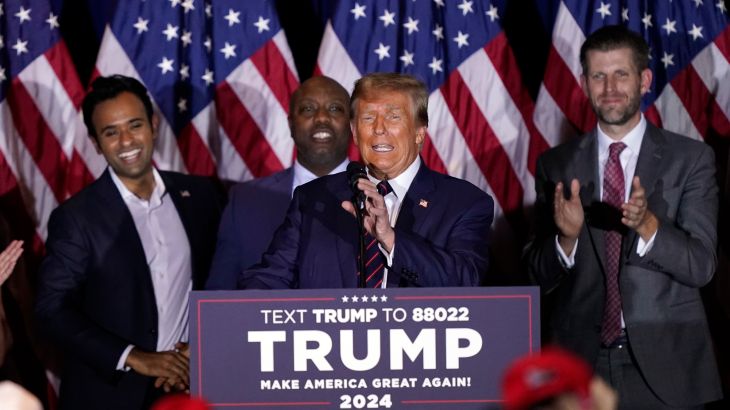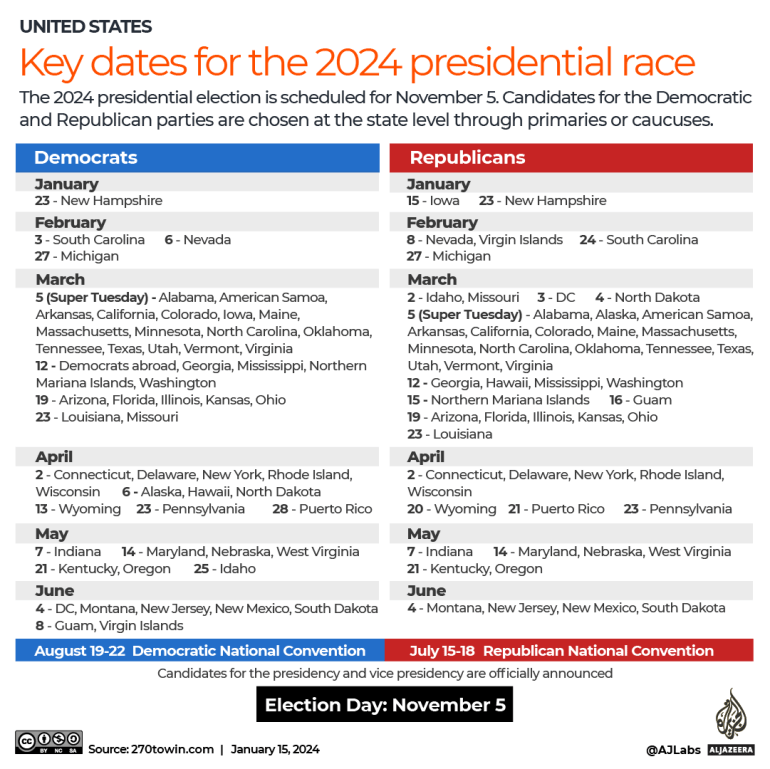Trump wins New Hampshire primary: Five key takeaways and what’s next
Trump attacks Haley after his New Hampshire win cements his position as the Republican frontrunner.

United States Republican presidential frontrunner Donald Trump has solidified his hold on his party’s electorate after his New Hampshire primary win against Nikki Haley, his only other major Republican rival left in the race. Here are the key takeaways from the contest:
Trump’s way forward
Trump won 54.6 percent of Tuesday’s vote in New Hampshire while Haley won 43.2 percent By late Tuesday in the northeastern US state, 20 of its 22 delegates to the Republican National Convention had been allotted based on the voting: 11 going to Trump and eight to Haley.
Keep reading
list of 4 itemsTrump testimony in doubt as defamation lawsuit postponed
New Hampshire primaries: A muted ‘circus’ with Biden missing from ballot
Could the New Hampshire primary be Haley’s last stand against Trump?
While opinion polls had tipped Trump as the winner, many analysts had suggested that Haley stood a chance against him in New Hampshire, a state with a high number of unaffiliated and independent voters and a conservative base that is more moderate than in many other states. Haley was even backed by the state’s popular governor, Chris Sununu.
However, the indicted former president won fairly easily, putting himself on a glide path to a third consecutive Republican presidential nomination. The biggest threat to his nomination, according to some analysts, comes from the possibility of a conviction and jail time as an outcome of one of the several trials Trump faces.

Warning signs for Trump
Trump’s victory wasn’t nearly as sweeping as his Iowa win last week, but it was never expected to be in a state with an electorate packed with moderate Republicans and independents.
Trump did not carry key groups of swing voters. Haley beat Trump among primary voters who identify as moderates as well as independents, 60 percent of whom voted for Haley, according to exit polls by Edison Research. She also beat Trump among those with college degrees 56 percent to 41 percent.
A town-by-town map shows Trump fell to Haley in New Hampshire in many of the same areas where he lost to Biden in the 2020 presidential election.
Perhaps the biggest warning sign of all was on abortion. The issue did not hurt Trump in the primary but could be central in a matchup against Biden.
Among voters who considered the issue their top priority, Haley won 64 percent to 30 percent even though she is arguably as conservative — if not more — on the issue than Trump. The former US president has bragged about his role in getting the US Supreme Court to overturn Roe v Wade, a 1973 high court ruling that had said the US Constitution protected a right to abortion, yet he has in recent weeks also spoken of the need to find a middle ground on abortion restrictions.
Haley too has backed the right of states to enforce abortion restrictions but has cautioned that it might be difficult, even for a Republican administration, to push through a nationwide ban.
Haley still in the race
Despite Haley’s defeat, she has strongly suggested she would stay in the race until at least the primary in her home state of South Carolina on February 24.
“New Hampshire is first in the nation. It’s not last in the nation. This race is far from over,” Haley told cheering supporters in Concord, the capital of New Hampshire.
Haley’s team pointed out that roughly five in 10 primary voters do not support Trump. Her advisers insist she will stay in the race to serve as a vehicle for those anti-Trump forces who are still hoping that the former president might be forced out of the race by his legal problems.
Joe Biden’s win
Despite not being on the Democratic primary ballot, President Joe Biden won among the Democrats, beating Minnesota congressman Dean Phillips.
More than 30,000 Democrats braved the cold to write in Biden’s name even though it meant nothing in the grand electoral scheme.
No delegates to the Democratic National Convention in August will be selected from the primary vote. This is due to a dispute between the Democratic National Committee (DNC) and the New Hampshire governor after the DNC announced that New Hampshire would no longer be the first Democratic primary in the nation, leading Biden not to register for the ballot even though the state went ahead with the primary.
Reminiscent of the 2020 presidential race, Trump and Biden will likely face off again in 2024 for a rematch that many voters say they do not want.
Trump’s speech
After Haley announced she will remain in the race, Trump attacked her in his victory speech. He said that when the primary contest reaches her home state of South Carolina, “we’re going to win easily.”
Trump’s address was loaded with his trademark warnings about immigration as he continued to lie about winning the 2020 election.
At one point swearing on primetime TV, Trump said the US was a “failing country” and claimed that undocumented migrants were coming from psychiatric hospitals and prisons and “killing our country”.
“We are going to win this. We have no choice. If we don’t win, I think our country is finished.”
What’s next
Haley’s campaign manager, Betsy Ankney, noted that multiple states on the primary calendar will have setups similar to New Hampshire, where independents could influence the vote.
South Carolina is holding its Democratic and Republican primaries on different dates. It allows any voter who doesn’t first cast a ballot in the Democratic primary on February 3 to vote in the Republican contest on the 24th. Michigan, which follows, has an open primary, which means voters don’t have to vote in their own party’s primary but may “cross-over” and vote in the other party’s.
Then comes Super Tuesday on March 5 when 874 delegates are up for grabs a 15 states and one US territory. Ankney said roughly two-thirds of those are in states with open or semi-open primaries.
She named Virginia, Massachusetts, Texas and North Carolina among states where Haley could perform well with independent or moderate voters whom the campaign views as persuadable.
If Trump blows Haley out in her home state of South Carolina, where she served two terms as governor, she will likely face mounting pressure to quit the race. Until then, Haley has a month to campaign, raise money and position herself as the only anti-Trump Republican left.
Trump’s inability to rally support among independent voters, college-educated voters and abortion rights supporters — the base that Haley is targeting in the Republican primaries — shows his weakness among a segment of the population that Biden will hope to assemble into a coalition ahead of November.
In the meantime, Trump is facing 91 felony counts across four indictments. The federal trial over Trump’s alleged efforts to overturn the 2020 election is tentatively set to begin on March 4, the day before Super Tuesday.
